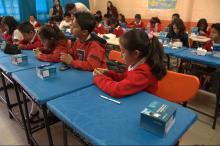Reducing Single-Use Plastic Pollution: A Unified Approach
Organizations, partnered with the corporate sector and individual citizens at the local level, can significantly reduce plastic pollution around the world.
How Wildlife Conservation Can Benefit Sustainable Human Development
The work of the Convention on International Trade in Endangered Species of Wild Fauna and Flora (CITES) and other major wildlife and biodiversity conventions shows that implementing a global framework for conservation can yield results for human development.
Closing the Gender Gap in Science and Technology
When I founded Girls Who Code, it was because I understood that STEM jobs had the power to lift entire families into the middle class and transform our modern-day technologies and economies.
Connecting Innovation and Culture for Cities of Opportunity
Ultimately, the Tenth Session of the World Urban Forum will be an important milestone event in the lead-up to 2030. We intend to establish as its most lasting legacy the opportunity to transform advocates into participants and policy into practice.
Championing Education for People, Prosperity, Planet and Peace
Leaving no one behind is not a numbers game, but one that calls for re-evaluating and reimagining what education means and provides. This year’s International Day celebrates precisely how learning can empower people, foster peace, build shared prosperity and protect a fragile planet.
Recognizing and Overcoming Inequity in Education
Education has proven to affect general well-being, productivity, social capital, responsible citizenship and sustainable behaviour.
The Global 16 Days Campaign: Taking on a Life of Its Own
The Global 16 Days Campaign is underpinned by feminist values, human rights principles and the belief that a world without violence is possible.
Rural Women’s Economic Empowerment and the Road to 2030: Agency for Climate Action
In spite of the observable economic restraints, rural women continue to be instrumental in adapting to and mitigating the negative impacts of climate change.
The Nelson Mandela Rules: Protecting the Rights of Persons Deprived of Liberty
The Nelson Mandela Rules emphasize that the provision of health care for prisoners is a State responsibility, and that the relationship between health-care professionals and prisoners is governed by the same ethical and professional standards as those applicable to patients in the community. Moreover, the Rules oblige prison health-care services to evaluate and care for the physical and mental health of prisoners, including those with special needs.
The Pursuit of Rights and Choices for All
Population policies today are about people, not numbers, and about the rights of individuals and couples to freely decide whether, when or how often to have children. But it has not always been this way.






















